Youth Justice
Last Modified 28/03/2023 17:20:12
Share this page
Introduction
The youth justice system In England and Wales works to prevent offending and reoffending by children. It is different to the adult system and is structured to address the needs of children. The system is overseen by the Youth Justice Board (YJB) on behalf of the Secretary of State for Justice. Having recently shifted focus from a predominantly risk-based model to a 'Child First' rights-based approach1, the YJB's vision is for a system "that sees children as children, treats them fairly and helps them to build on their strengths so they can make a constructive contribution to society", thereby preventing offending and creating safer communities with fewer victims2.
As part of an integrated approach to the needs of young people, Blackpool's Youth Justice Team is part of the wider Blackpool Adolescent Service. The team is a multi-agency partnership comprised of staff from social care, education, the Police, the National Probation Service and local health services. It operates in accordance with the Crime and Disorder Act 1998 and subsequent Criminal Justice Acts, with the role of supervising and supporting children aged 10 to 17 years who have committed offences and have received an Out of Court disposal or an order from the court.
The service has embedded the Blackpool Families Rock Model - a child-first, restorative and trauma-informed approach - into its work and strives to reduce the impact of crime on victims and communities by supporting children to maintain positive, healthy and pro-social futures. The service has a key focus on prevention and diversion of children out of criminal justice processes, offering the right help at the right time.
Facts and Figures
Police arrests for recorded crime (notifiable offences) act as the gateway to the youth justice system. Across England and Wales the number of arrests for notifiable offences among children aged 10 to 17 years reduced by 70% between 2010/2011 and 2019/2020. In 2010/11 (April to March) there were 201,700 arrests of children in England and Wales, compared to 61,100 in 2019/20 (Figure 1). Around 85% of these arrests were young males.
The number of children cautioned or sentenced in England and Wales reduced from 85,300 in 2010/11 to 19,000 in 2019/20 (a 76% decrease), with immediate custodial, community and other sentences reducing by similar rates3.
Figure 1: Arrests for recorded crime (notifiable offences) of children aged 10 to 17, 2010/11 to 2020/21, England
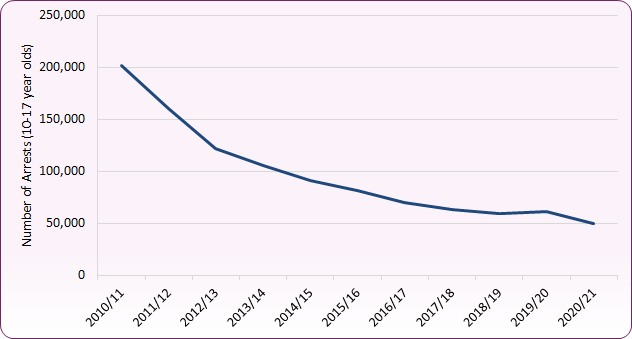 Source: Youth Justice Board for England and Wales, Youth Justice Statistics 2020 to 2021 supplementary tables.
Source: Youth Justice Board for England and Wales, Youth Justice Statistics 2020 to 2021 supplementary tables.
Blackpool, and the wider area covered by Lancashire Constabulary, has seen similar trends over the last decade. Arrests for notifiable offences among 10 to 17 year olds across the Lancashire police force area fell 83% between 2010/11 (8,030 arrests) and 2019/20 (1,342 arrests).
There are multiple reasons for the decline in children within the youth justice system, with at least some of the reduction attributed to the success of schemes that divert children and young people from court; behavioural approaches that aim to reduce persistent offending; and family systems approaches aimed at reducing disruptive behaviour and tackling issues such as substance misuse4,5.
Whilst there has been a downward trend over the last ten years, the COVID-19 pandemic also impacted on the youth justice system in a range of ways: from court closures, paused trials and resulting backlogs, to changes to custodial regimes, and to people's behaviour (including reduced social contact and potential criminal activity).
In COVID-19 affected 2020/21 there were 49,500 arrests for notifiable offences among children aged 10 to 17 years across England and Wales (a rate of 3.9 per 1,000 of the 0-17 population or 8.8 per 1,000 of the 10-17 population). This was a 19% reduction on 2019/20. Similar reductions were also observed in other areas of the youth justice system, with 15,800 children cautioned or sentenced (17% reduction on 2019/20), 8,848 new entrants to the system (20% reduction), and 673 children sentenced to immediate custody (41% reduction).
In 2020/21 there were 1,273 arrests for notifiable offences among 10 to 17 year olds across Lancashire, a 5% reduction from 2019/20. The Lancashire rate was 4 per 1,000 of the 0-17 population, or 8.8 per 1,000 of the 10-17 population.
Proven Offences, Cautions and Sentences
Courts have a range of sentencing options for children and young people aged 10 to 17:
- Absolute discharge - the court decides not to impose a punishment because the court experience is regarded as punishment enough
- Conditional discharge - if the child commits another crime they can be sentenced for the first offence as well as the new one
- Fines - reflecting the offence committed and the child or young person's ability to pay
- Referral Orders - requiring the child to attend a youth offender panel and agree a contract with commitments which will last from three months to a year. The aim is for the child to make up for the harm caused and to address their offending behaviour.
- Youth Rehabilitation Orders - a community sentence with requirements that the offender must comply with (e.g. curfew, supervision, unpaid work, drug treatment, electronic monitoring, mental health treatment, education). Orders may last up to three years.
- Custodial sentences - imposed in the most serious cases, aiming to provide training and education and rehabilitating the offender so they do not re-offend. Sentences can be spent in secure children's homes, secure training centres or youth offender institutions. A Detention and Training Order is a custodial sentence of between four months and two years, available for those aged 12 to 17. Longer term sentences can also be imposed by crown courts, depending on the offence committed.
Community Resolutions provide an opportunity for the police to deal with appropriate low level offences without recourse to the formal criminal justice sanctions. This could include a simple face to face or letter of apology, an offer of compensation or promise to clear up any graffiti or criminal damage. A Youth Caution is a formal out-of-court disposal where a child admits a criminal offence and police have enough evidence to prove an offence was committed. A Youth Conditional Caution is a caution with one or more conditions attached. If a child does not keep the conditions they may be prosecuted for the offence.
Between April 2020 and March 2021 there were 173 proven offences committed by children (aged 10 to 17) in Blackpool. This is a 71% reduction from the 603 proven offences in 2013/14, but similar to 2019/20 levels (175 offences). In comparison, there was a 58% reduction in proven offences among 10 to 17 year olds across England and Wales between 2013/14 and 2020/21, though the number of offences nationally fell by 22% between 2019/20 and 2020/21. The 2020/21 rate of proven offences among the 10 to 17 Blackpool population was 1,372 per 100,000, compared to 687 per 100,000 across England and Wales.
As with national trends, whilst overall numbers of proven offences committed by 10 to 17 year olds in Blackpool have declined since 2013/14 for most types of offence, the proportion of serious offences has increased. In 2019/20, 38% of all offences involved violence against the person (23% in 2013/14). The COVID-19 affected 2020/21 period also saw some changes in proportions of proven offences, with reductions in the proportion of burglaries (5% in 2020/21 compared to 9% in 2019/20) and increases in robberies (7% compared to 4%) and sexual offences (8% compared to 4%). Blackpool does, however, have a significantly higher number of arrests of children compared to Lancashire Constabulary neighbours Lancashire (County Council area) and Blackburn with Darwen.
In 2020/21, 64 Blackpool children aged 10 to 17 received a caution or a sentence within the youth justice system (Figure 2). 83% were aged between 15 and 17 (82% across England and Wales). In line with national trends, the number of young people receiving cautions or sentences in 2020/21 is almost a third of that in 2013/14.
Figure 2: Number of Young People Cautioned or Sentenced (10-14s and 15-17s), Blackpool 2013/14 to 2020/21
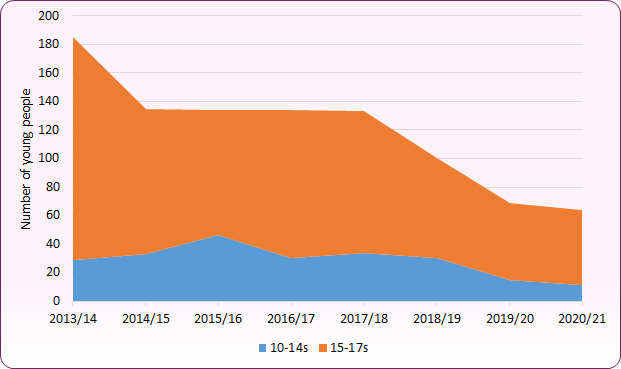 Source: Youth Justice Board for England and Wales, Youth Justice Statistics 2020 to 2021 local level open data.
Source: Youth Justice Board for England and Wales, Youth Justice Statistics 2020 to 2021 local level open data.
The 2020/21 rate of cautions and sentences among those aged 10 to 17 in Blackpool was 510 per 100,000 population (10-17s). The overall rate for England and Wales was 280 per 100,000. The gap has, however, narrowed significantly since 2017/18 (Figure 3).
Figure 3: Cautions and Sentences for 10 to 17 Year Olds, Blackpool, North West and England, 2013/14 to 2020/21 (rate per 10,000 10-17s population)
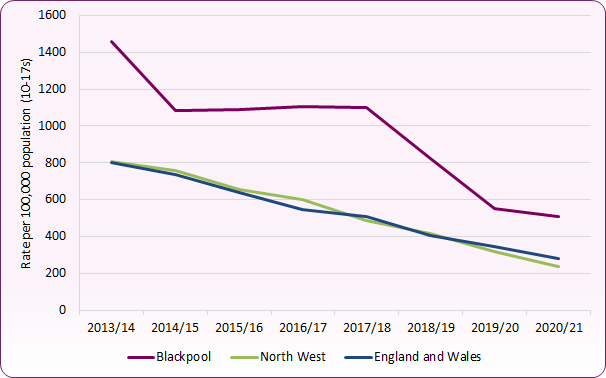 Source: Youth Justice Board for England and Wales, Youth Justice Statistics 2020 to 2021 local level open data / ONS Mid-year population estimates.
Source: Youth Justice Board for England and Wales, Youth Justice Statistics 2020 to 2021 local level open data / ONS Mid-year population estimates.
Between April 2021 and March 2022, 100% of school-aged children in Blackpool on Referral Orders, Youth Referral Orders or Detention and Training Orders Licenses were in employment, education or training at the end of their sentence (compared to 53% nationally), with 55% in full-time education (24% nationally). 83% were in suitable accommodation, compared to 84% across England and 88% in the North West. For those above school age, 58% of young people in Blackpool were in employment education and training (compared to 43% nationally), 48% full-time (36% nationally).
5% of Blackpool's looked after children were subject to a conviction, final warning or reprimand in 2021, compared to 2% across England, though 2021/22 data from the service suggests that 2% of 'Our Children' (looked after children) are currently involved in the Youth Justice Service.
First Time Entrants to the Youth Justice System
Reducing the number of first time entrants is a key priority for the youth justice system. Approximately 35 children aged 10 to 17 resident in Blackpool entered the youth justice system for the first time between January and December 2020. This is an 85% reduction from 2010, when there were 237 first time entrants (FTEs). The rate of first time entrants in 2020 was 280 per 100,000, a slight increase on 2019/20 (Figure 4).
Across England and Wales the average age of first time entrants to the youth justice system in 2020/21 was 15.5 years, a slight increase from 15.3 during 2018/19 and 2019/20. The average age of those receiving a caution was 15.1 years, compared to 15.8 for those receiving a sentence. 85% of new entrants in 2020/21 were male.
Figure 4: First Time Entrants (FTEs) Into the Youth Justice System, Blackpool, North West and England, 2010 to 2020 (rate per 100,000)
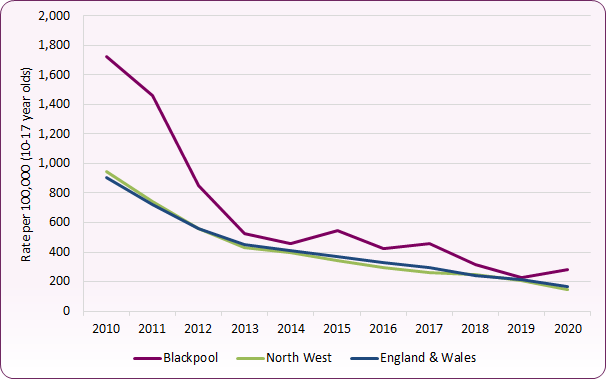 Source: Youth Justice Board for England and Wales, Youth Justice Statistics 2020 to 2021 supplementary tables / ONS Mid year population estimates. Note: Calendar year data matching to local authority areas results in approximated values.
Source: Youth Justice Board for England and Wales, Youth Justice Statistics 2020 to 2021 supplementary tables / ONS Mid year population estimates. Note: Calendar year data matching to local authority areas results in approximated values.
Use of Custody
The rate of children receiving custodial sentences in Blackpool in the 2020 calendar year was 0.16 per 1,000 of the 10 to 17 population, compared to 0.14 across England and Wales and 0.16 in the North West. The national custodial rate has reduced year-on-year since 2013 (when it was 0.55 per 1,000). In Blackpool the rate has reduced each year since 2017 when it was 0.99 per 1,000 population.
Proven re-offending
A proven re-offence is defined as any offence committed in a one year follow-up period that resulted in a caution or sentence within the one year follow-up or a further six month waiting period6.
Nationally the rate of proven re-offending among 10 to 17 year olds has been reducing since the mid 2010s, with local rates falling more sharply. In the period 2019/20, 31.1% of offenders re-offended in Blackpool, compared to 34.2% nationally (Figure 5). The average number of offences recorded per re-offender has also fallen, from 5.4 in 2017/18 to 4 in 2019/20, though it remains above the national level of 3.6 per re-offender.
Figure 5: Proportion of 10 to 17 Year Old Offenders Who Are Proven to Reoffend, Blackpool, England & Wales and North West, 2016/17 to 2019/20
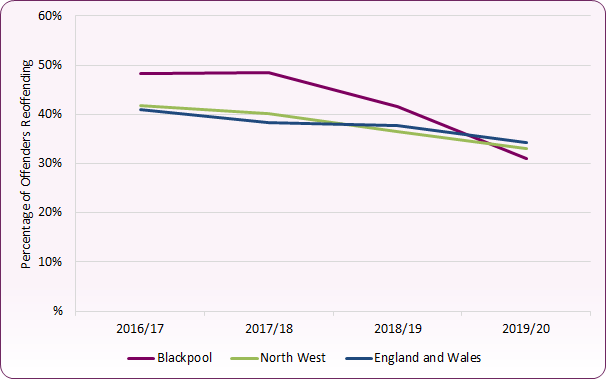 Source: Youth Justice Board for England and Wales, Youth Justice Statistics 2020 to 2021 supplementary tables
Source: Youth Justice Board for England and Wales, Youth Justice Statistics 2020 to 2021 supplementary tables
Health Needs of Those in the Youth Justice System
Children and young people in contact with the youth justice system may have more - and more severe - health and well-being needs than other children of their age. Many of the children and young people in contact with the youth justice system in Blackpool will also be known to children's social care and be among those children and young people who are not in education, employment or training (NEET). Due attention to their health needs should help reduce health inequalities and reduce the risk of re-offending by young people.
70% of the Blackpool youth justice cohort have mental health needs, and for 38% this is a risk or concern. Half of the young people are identified as currently endangering their own health through their behaviour. 18% of the cohort have identified physical health needs.
National and Local Strategies
National Level:
The Youth Justice Board for England and Wales Strategic Plan 2021-24 reaffirms the commitment to the Child First approach in order to:
- Prioritise the best interests of children and recognise their particular needs, capacities, rights and potential. All work is child-focused, developmentally informed, acknowledges structural barriers and meets responsibilities towards children.
- Promote children's individual strengths and capacities to develop their pro-social identity for sustainable desistance, leading to safer communities and fewer victims. All work is constructive and future-focused, built on supportive relationships that empower children to fulfil their potential and make positive contributions to society.
- Encourage children's active participation, engagement and wider social inclusion. All work is meaningful collaboration with children and their carers.
- Promote a childhood removed from the justice system, using pre-emptive prevention, diversion and minimal intervention. All work minimises criminogenic stigma from contact with the system.
Local Level:
In September 2021, Blackpool youth offending services were inspected by HM Inspectorate of Probation. The report recognised Blackpool's services as 'Good', with some areas outstanding.
Haines, K., and Case, S. (2015) Positive Youth Justice: Children First, Offenders Second. Bristol: Policy Press.
Youth Justice Board for England and Wales (2022) YJB Business Plan 2022-23.
Youth Justice Board for England and Wales, Youth Justice Statistics: 2020 to 2021. National figures are round to nearest hundred.
House of Commons Justice Select Committee (2020) How has the youth justice population changed?
Local Government Association (2022) Supporting the youngest children in the youth justice system: what works to reduce offending and improve outcomes.
See MoJ Guide to Proven Reoffending Statistics for further information.